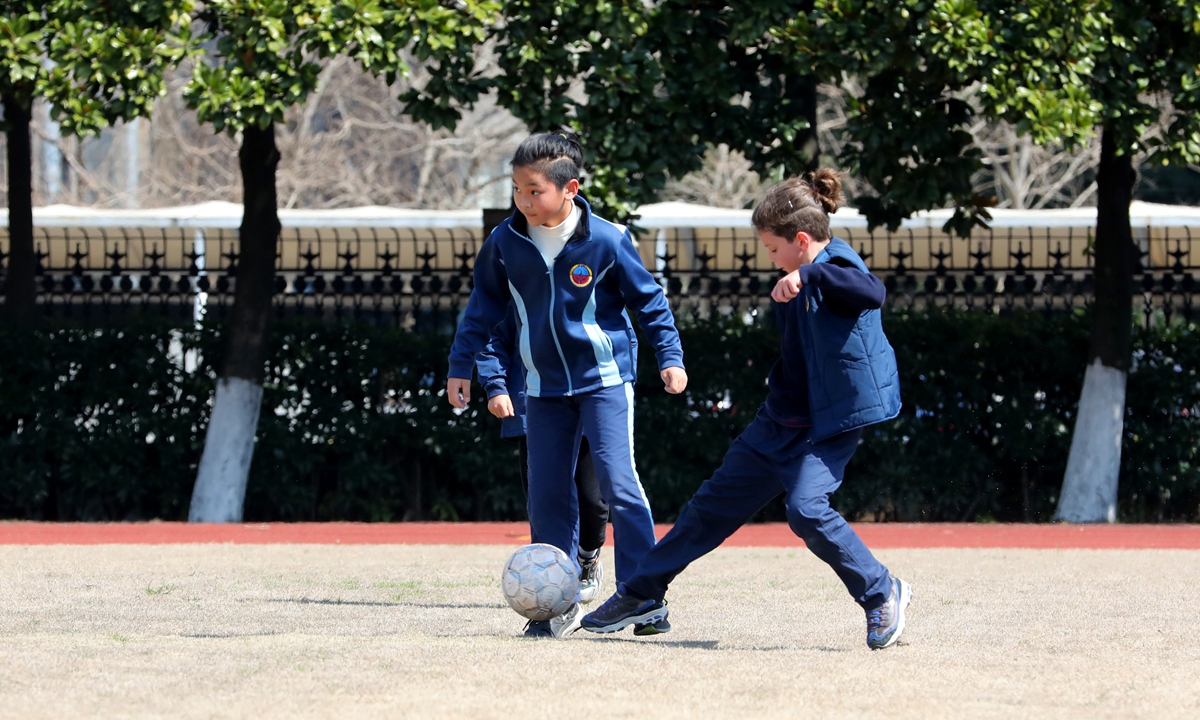ARTS / CULTURE & LEISURE
Expats find advantages in bringing up their families in China
More than fine

Chinese and foreign students enjoy outdoor campus activities in an international school in Ningbo, East China's Zhejiang Province. Photo: Chen Xia/Global Times
An article in The New York Times titled China Helped Raise My American Kids, and They Turned Out Fine by a US mother may partially explain why an increasing number of expat families are choosing Chinese schools for their children, given that more and more people from Western countries have been enjoying working and living in China as the country continues to expand opening-up.These expat families believe that living in a fast-developing country with very low crime rates does much more good than bad, and their children can learn Chinese, a very important foreign language. They regard themselves as an active part of the Chinese economy and they also contribute through the efforts they make in their careers.
Local education
Among them are John Burrows from Britain, who works at the University of Nottingham Ningbo China, and his South Korean wife Rachel Kim. The couple live in Ningbo, a city in East China's Zhejiang Province. Their children, 9-year-old John and 7-year-old Ella, are studying in the Chinese private Huamao International School in the city's Yinzhou district.
"Why did we decide to move to China? There were lots of factors, including international experience for the kids and the job opportunities. We felt it would be good to raise them internationally so that they become more like an international citizen. Naturally we engage them in the Chinese education system, and the big thing is that we want them to learn Chinese," Burrows told the Global Times.
"Both my son and daughter are very happy to be in this international school with the International Baccalaureate [IB] Program. Every day when they come home, they say what they did, and especially my daughter is so excited to share about what she's done at school. We are quite satisfied with the school, the IB course and the English and Chinese bilingual environment," echoed Kim.
"I don't think there is such a thing as an ideal education system. It's heavily based in culture and value. Certain aspects of the Chinese education system or the Eastern education system are better than the Western education system. The Chinese education system is respect-based; that is a really important value. It explains a lot about why the crime rates are much lower in cities like Ningbo and big cities like Shanghai compared to European cities," said Burrows.
Burrows said that he was very pleased to read The New York Times article, especially agreeing with one paragraph, which said, "With crime and personal safety concerns virtually eliminated, our daughters were riding the subway unsupervised in a city of around 26 million people from the age of 11."
On the point of freedom, Burrows said there are different attitudes toward it.
"In the West, sometimes we look at freedom in a very narrow sense of having more political choice, but things like economic prosperity and low crime rates are actually, in a real sense, much greater freedoms," Burrows said.
He said that he felt living in a country with a very low crime rate is something that's probably the most important. In their six and a half years of living in Ningbo, the family has witnessed the city develop into a more vibrant and exciting place.
"We appreciate the fact that it's given us a lot. We are an active part of the economy. We have the opportunity to earn money here and we also give value. I teach students, I'm adding value to Chinese society. It's a positive reciprocal relationship.
"Personally, I get a strong sense of freedom here from those things that I was talking about, especially crime, and the sense that you don't have to be on edge so much as you might be in certain Western countries," Burrows said.
Kim said that she has been a supporter of China's COVID-19 management measures from the beginning. "We have been well protected in the past three years and the recent downgrading adjustment is also appropriate."
Different perspectives
On the campus of the international school in Ningbo, John and Ella get along well with their teachers and schoolmates, Chinese and international, whether playing soccer in the playground or having classes.
Burrows' opinion was echoed by Mbali from South Africa, an IB teacher who has teaching experience in South Korea, Malaysia and South Africa. Her two children are also studying in Huamao.
"My son is in middle school here and he's grown quite a lot. He's communicating in Chinese, which is really nice to see… He's got friends from different cultures and just understands that the world is different from home," Mbali told the Global Times.
Tina Tian, John's class teacher, shared with the Global Times the advantage of China's international schools.
"It's a multicultural environment here. Students from different nationalities work, study and play together with the same goal to have an international mind-set. We have the Chinese national curriculum to integrate with the IB program. Our curriculum goes from local to national, then to international."
Tian also noted that the school celebrates both the Spring Festival and the UN Day.
"We learned about food and we started to research about Ningbo local food, and different cuisine in different parts of China, then we looked abroad to international food culture, which helps students to have both local and global minds," said Tian.

